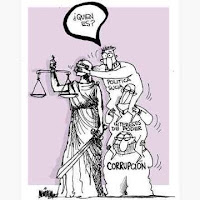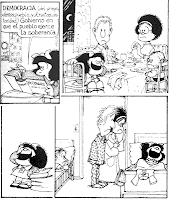
QUE VIVA LA UTOPIA, ALWAYS FRESH AND HOT AT THE SAME TIME
 recently at a meeting academic college, talking to my students about the processes of social signification of public physical space over time. As a reference we analyzed what had happened to the old strip of La Union, in downtown Lima. If a "privatized" for recreational purposes by the aristocracy in the late nineteenth and early twentieth century, the National Club and the Union Club in their time of greatness were demonstrating this new social dynamics, incorporating new actors typical of Lima distinct Lima mass of a post 50 (migration, urbanization, etc..) meanings to the artery passed Lima, reappropriating symbolically (the expression "going to shreds" translate this process to slang back in the 70 and 80). This reappropriation did not mean being free of tension and conflict with what was redefined field (including its own representatives as with the old aristocracy Unionist).
recently at a meeting academic college, talking to my students about the processes of social signification of public physical space over time. As a reference we analyzed what had happened to the old strip of La Union, in downtown Lima. If a "privatized" for recreational purposes by the aristocracy in the late nineteenth and early twentieth century, the National Club and the Union Club in their time of greatness were demonstrating this new social dynamics, incorporating new actors typical of Lima distinct Lima mass of a post 50 (migration, urbanization, etc..) meanings to the artery passed Lima, reappropriating symbolically (the expression "going to shreds" translate this process to slang back in the 70 and 80). This reappropriation did not mean being free of tension and conflict with what was redefined field (including its own representatives as with the old aristocracy Unionist).
 social signification processes do not apply only to things but also the intangible realities. When referring to historical events or concepts and ideas involved, many times, logical interests that usually are organized in relation to other different interests, when not competing.
social signification processes do not apply only to things but also the intangible realities. When referring to historical events or concepts and ideas involved, many times, logical interests that usually are organized in relation to other different interests, when not competing.
 recently at a meeting academic college, talking to my students about the processes of social signification of public physical space over time. As a reference we analyzed what had happened to the old strip of La Union, in downtown Lima. If a "privatized" for recreational purposes by the aristocracy in the late nineteenth and early twentieth century, the National Club and the Union Club in their time of greatness were demonstrating this new social dynamics, incorporating new actors typical of Lima distinct Lima mass of a post 50 (migration, urbanization, etc..) meanings to the artery passed Lima, reappropriating symbolically (the expression "going to shreds" translate this process to slang back in the 70 and 80). This reappropriation did not mean being free of tension and conflict with what was redefined field (including its own representatives as with the old aristocracy Unionist).
recently at a meeting academic college, talking to my students about the processes of social signification of public physical space over time. As a reference we analyzed what had happened to the old strip of La Union, in downtown Lima. If a "privatized" for recreational purposes by the aristocracy in the late nineteenth and early twentieth century, the National Club and the Union Club in their time of greatness were demonstrating this new social dynamics, incorporating new actors typical of Lima distinct Lima mass of a post 50 (migration, urbanization, etc..) meanings to the artery passed Lima, reappropriating symbolically (the expression "going to shreds" translate this process to slang back in the 70 and 80). This reappropriation did not mean being free of tension and conflict with what was redefined field (including its own representatives as with the old aristocracy Unionist).  social signification processes do not apply only to things but also the intangible realities. When referring to historical events or concepts and ideas involved, many times, logical interests that usually are organized in relation to other different interests, when not competing.
social signification processes do not apply only to things but also the intangible realities. When referring to historical events or concepts and ideas involved, many times, logical interests that usually are organized in relation to other different interests, when not competing. Consider, for example, what happened to the idea of \u200b\u200bdemocracy. Thomas Jefferson, who was the third president of the United States between 1801 and 1809, defined democracy as government by the people, by the people and for the people. Consequent with this, conceived as a democratic participation, promoting self-employment of workers instead of wage labor and raising criticisms of the structure of land ownership at the time and was based on the large property of the landowners (concrete expression of economic power U.S. at the time).
democracy of Jefferson was, according to some scholars of this, a libertarian and anarchist character. It was clear that one of the "fathers of democracy", the latter word had contained thousands of times more extensive than just a political system or government. What is the ideal Jeffersonian in so-called democratic societies today? What remains of Jeffersonian democracy in the political and social system of America itself?

The idea of \u200b\u200bdemocracy has been redefined, resignified by special interests so that almost finished emptying the content. It is not intended as a complete lifestyle, holistic, comprehensive, spanning all aspects and levels of human life (economic and social included), but she is dropped, maliciously, to a form of political rule defined focused only on the voting representative. And with this parameter is universalized by the global power as the only valid, it is evaluated today, are "judged", would say, with authority autoconferida by force, who is democratic and who is not part of the country's current government is, paradoxically, the home of Jefferson!
Something similar has happened with the term utopia has tended toward the defacement by a Manichean redefinition process that unfortunately is widespread in society, even across social levels. The sense of the word utopia has come to be rooted in the consciousness of many people associated with the idea of \u200b\u200b"impossible dream", or "being out of touch" "Living in the clouds." Something like what happened to the idea of \u200b\u200b"person", defined as someone well-intentioned but probably is not "realistic." Thus, under this ideological perspective, utopia is different and even opposed to reality. Thus, a person is opposed to a utopian realist. The spread of this way of thinking involves, in my opinion, a serious danger to humans and the possibilities of personal and social. This danger is a permanent and rational falsely daily invitation to actively stop dreaming, to bury the personal and collective imagination in the name of "realism rational. " What future is as a person who is unable to dream actively (not passively as a "pipe dream")? What is a people if it is unable to dream of another world, another possible reality?
 And here it becomes necessary to rescue the other sense of the word utopia understood as "north" to reach a dream that can build desire for change, transformation. Understood as utopian dream immobilizer but not otherwise (the utopia as a mobilizing myth in amauta José Carlos Mariategui ). Utopia you dream not with the eyes closed but with eyes wide open and that, therefore, calls daily to the action of one and / or many. Utopia is being proposed as the beacon that will guide our steps in search of the goals we have set. Utopia is worth less by the absolute achievement ideal but by the approach proposed increasing towards him in the way of a commitment to continuous improvement (the road to truth is the path of successive approximations "said the philosopher Kant .)
And here it becomes necessary to rescue the other sense of the word utopia understood as "north" to reach a dream that can build desire for change, transformation. Understood as utopian dream immobilizer but not otherwise (the utopia as a mobilizing myth in amauta José Carlos Mariategui ). Utopia you dream not with the eyes closed but with eyes wide open and that, therefore, calls daily to the action of one and / or many. Utopia is being proposed as the beacon that will guide our steps in search of the goals we have set. Utopia is worth less by the absolute achievement ideal but by the approach proposed increasing towards him in the way of a commitment to continuous improvement (the road to truth is the path of successive approximations "said the philosopher Kant .) I think we should rescue the utopian sense should be our life as human beings, such as personal and collective realities. It is painful when the dare to dream different and disappears from the collective minds of our new generations of Peruvians. But what can we admonish young people if we, the not so young, renounce utopia?.
Thomas Jefferson was president of the United States at 58 years old and ruled until 66. Next to Abraham Lincoln were established leaders of change in that country. Personally, the whole history of U.S. presidential politics rescued these two cases because of their historical significance and its commitment to libertarian and human causes. Both, in my opinion, were, not incidentally, typically utopian characters, in the true and only sense valid word.
That tomorrow and the following days will be good time to live. Daniel Zevallos
Chavez
0 comments:
Post a Comment